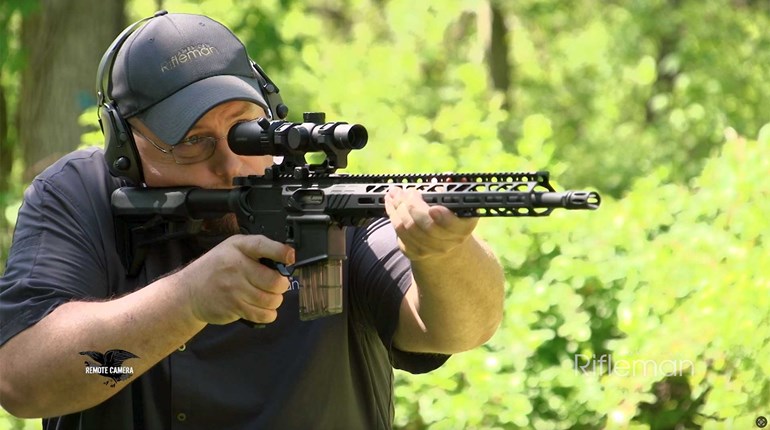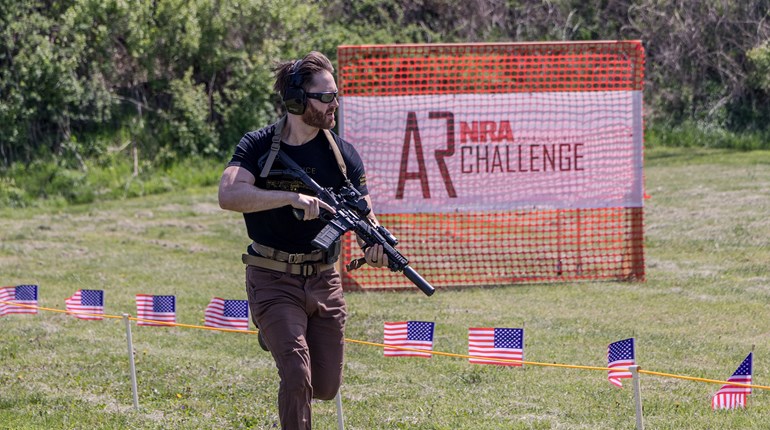
A few months ago, I wrote about how Joe Biden plans to use executive actions and enforcement authorities to wage war on America’s gun owners and the industries that support them.
Subsequent events have only confirmed that analysis, none more so than Biden’s latest choice to run the Bureau of Alcohol, Tobacco, Firearms and Explosives (ATF). That nominee, anti-gun lawyer Steven Dettelbach, is every bit the partisan gun-control activist as his failed predecessor, David Chipman. And, left to his own devices, Dettelbach will do just as much damage to Americans’ Second Amendment rights.
But, as with Chipman, the NRA certainly doesn’t intend to leave Steven Dettelbach to his own devices as ATF director.
To understand why Dettelbach is such a threat, it’s necessary to revisit the history that led up to his nomination.
Joe Biden, of course, was falsely portrayed by his collaborators in the legacy media as the “centrist” and “unifying” choice for the White House, after what they claimed was the polarizing and divisive administration of his predecessor, Donald Trump.
But the NRA exposed Biden as the malarkey moderate he truly is, especially when it comes to firearms. During the campaign, Biden courted big Democrat donors with all manner of extreme gun control, up to and including confiscatory bans on America’s most-popular rifle, the AR-15. When CNN’s Anderson Cooper asked candidate Biden what he would say to Americans who claimed he was coming for their guns, Biden replied, “Bingo! You’re right if you have an assault weapon.”
Whatever else can be said for Biden’s tenure in the White House and his fidelity to campaign promises, he has sought to make good on his vows to enact persecutory gun control.
Focused activism by the NRA and its members, along with a closely divided U.S. Senate and some authentically moderate Democrats from pro-gun states, have so far kept Biden’s extreme legislative agenda for gun control at bay.
But that simply means he has been forced to pivot to using the power of his own office to try to unilaterally inflict as much damage on the firearm industry and gun owners as possible.
The ATF under Biden has already been on a campaign of more-restrictive legal interpretations, “zero tolerance” inspections of dealers that make occasional paperwork or procedural errors, and extensive changes to administrative regulations aimed at facilitating crackdowns. I’ve discussed these in detail in other articles.
But the point here is that a weaponized ATF is only as good to gun controllers as the director whose finger is figuratively on the trigger.
Little wonder, then, that Biden’s initial choice to lead the agency was an actual bought-and-sold gun-control activist.
David Chipman had a (sometimes controversial) career as an ATF agent.
But his more-recent resume includes being an “advisor” for the gun-control movement and a paid shill for two of its most active organizations, Everytown for Gun Safety and Giffords.
As I mentioned at the time, Biden’s boldness in choosing such a polarizing and nakedly agenda-driven nominee demonstrated his open contempt for anyone who opposes his gun control policies.
The NRA made blocking Chipman’s appointment one of its highest priorities. Thanks to that campaign, and to the dedication of ordinary gun owners and NRA members who participated in the process, Chipman’s extremist record was exposed, and his nomination was eventually pulled.
In the meantime, ATF—under the watchful eye of Biden’s anti-gun attorney general, Merrick Garland—continued its anti-gun pressure campaign.
In April, this led to the publication of a new ATF regulation that purports to give the agency sweeping discretion over what sort of finished or unfinished parts constitute a regulated “firearm” or a regulated “frame” or “receiver” under federal law. This effort was part of a coordinated campaign between gun-control activists in the government and media to create a new moral panic around the idea of “ghost guns,” or personally made firearms.
Certainly, anyone who uses an unmarked, personally made firearm—or any weapon—to illegally harm someone else should be prosecuted accordingly to the full extent of the law.
But ghost guns are merely the latest in a long line of firearms that are sensationally portrayed as especially “problematic” and used to condition the public to the legitimacy of gun bans. These firearms have included, over the years, “Saturday night specials,” “assault weapons,” “undetectable” firearms, “sniper rifles,” “unsafe” handguns, and “3D printed guns,” among others.
Ghost guns don’t have features that supposedly make them deadlier than “mortal” firearms. But they do offer some anonymity that, like private sales, drives the control freaks of the gun-prohibition movement crazy. It’s bad enough for them that private individuals can own guns. But the idea that people can own guns without the government’s prior say-so, knowledge, or at least without documentation on some government-accessible form is a huge affront to their dream of one day rounding up all the known firearms.
Fittingly, Dettelbach’s nomination was announced in a Rose Garden ceremony on April 11 in tandem with the release of the “ghost gun” rule’s final language. It included all the trappings of a typical gun-control publicity stunt, including Joe Biden smearing firearm industry members as “merchants of death” who are “breaking the law for profit.”
But when it came to Dettelbach himself, Biden reverted to feigned pragmatism, even reminding the audience of his own supposed “support” for the Second Amendment. He portrayed Dettelbach as a dedicated lawman with a history of prosecuting violent criminals, and who, “in 2009, the U.S. Senate unanimously confirmed … to serve as a U.S. Attorney.”
What principled opposition could there be to such a professional and bipartisan choice?
Plenty, as it turns out.
It is true that Dettelbach, unlike Chipman, has no known history of being paid to advocate for gun control. And his public persona appears to be less confrontational.
But Dettelbach’s expressed views on firearm policy are just as extreme, and his allegiance to Biden’s and Garland’s anti-gun agenda is just as assured.
While running for Ohio attorney general in 2018, Dettelbach supported outlawing private firearm sales, expanding categories of prohibited persons, and banning “assault weapons,” gun-control speak for modern semi-automatic long arms. He also opposed the idea of defensively arming school personnel, even those with military or law-enforcement backgrounds.
During the Obama/Biden administration’s post-Sandy Hook gun-control push in 2013, Dettelbach appeared at a rally along with Michael Bloomberg’s Mayors Against Illegal Guns and used his position as U.S. attorney to lend weight to calls for additional firearm restrictions.
He has additionally used the emotional period that follows high-profile, firearm-related murders to make calls on social media for action against guns—a classic tactic of firearm prohibitionists—and recirculated propaganda from a gun-control organization.
Meanwhile, Dettelbach’s nomination has been endorsed by institutional gun-control lobbies, including Everytown for Gun Safety and Brady.
Just as telling as who Biden nominated for ATF director was who he did not.
The ATF’s acting director at the time Dettelbach was nominated was a 30-year career agent named Marvin Richardson. My readers may remember that Richardson was the subject of a The New York Times hit piece for supposedly being “industry-friendly” and attending a conference hosted by the National Shooting Sports Foundation, a trade group for America’s firearms and ammunition companies.
But, when reporting on Dettelbach’s nomination, the Times acknowledged “Dettelbach has never run a national law enforcement organization and has never worked at the A.T.F.”, while “[r]ank-and-file agents respect and like Mr. Richardson, according to multiple people who work with the bureau.”
Nevertheless, according to the Times, Richardson was never seriously considered because “Biden’s team wanted a new leader who would more aggressively enforce A.T.F. oversight of federal [sic] licensed gun dealers and new regulations, especially the ghost gun rule.”
Not only was Richardson passed over for consideration, he was demoted from his position as acting director upon Dettelbach’s nomination and replaced in that capacity by another Biden-appointed U.S. attorney with no hands-on law-enforcement experience. An unidentified ATF official was quoted in the media as saying this “came as a shock to most of us within the agency” and “left many ATF officials surprised and dismayed.” The source described Richardson as “apolitical” and one “who didn’t play favorites with the industry or the gun-control groups.” Richardson certainly couldn’t be described as “pro-gun,” but his lack of hatred for America’s law-abiding gun owners proved disqualifying for the Biden administration.
Yet Biden does not want a respected, veteran law-enforcement agent running ATF like a non-partisan law-enforcement agency. Instead, he wants a puppet and an attack dog who will use the agency to pursue a partisan gun-control agenda. It seems, by the estimation of gun-control activists themselves, Biden has found his man in Steven Dettelbach.
The situation also provides even more motivation, as if any were needed, for pro-gun voters to turn out in the midterm elections this November. While Dettelbach’s nomination will likely be acted upon before the election, putting solid, pro-gun majorities in both the U.S. House and Senate is the best way to rein in the Biden administration’s continued push to use executive power to attack our rights.


































